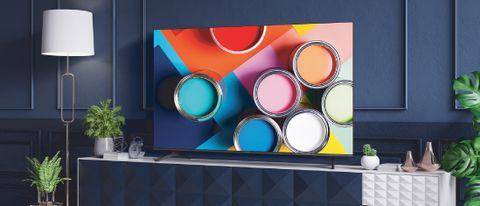TechRadar Verdict
The Hisense A6G is pretty admirable in a number of ways, but once you notice its shortcomings they’re hard to ignore.
Pros
- +
Detailed and colorful 4K images
- +
Good specs + HDMI 2.1 compatibility
- +
A lot of screen for the cash
Cons
- -
Doesn’t do ‘bright’, doesn’t do ‘dark’
- -
Smart TV interface feels restricted
- -
Sounds lackluster
Why you can trust TechRadar
One-minute review
With the A6G series, Hisense has done that classically ‘Hisense’ thing of delivering a big, well-specified television for really not very much money at all. HDR10+ and Dolby Vision HDR? Some HDMI 2.1 action and eARC? Voice control and a half-decent smart TV interface? At this price, Hisense, you are spoiling us.
Well, up to a point. There are definite positives to the native 4K pictures the A6G is capable of delivering, and it’s not the worst upscaler of Full HD content you ever saw either. It’s even decently rapid as a gaming monitor.
It’s not all that bright or all that dark a picture it serves up, though, and it’s pretty flat and 2D too. It’s not at all comfortable upscaling properly lo-res content, either, and the less said about the sound it makes the better.
None of this automatically makes the Hisense A6G poor value for money, of course. But it needs more excuses made for it than a lot of Hisense TVs we’ve seen lately.
Price and availability
- New for 2021
- Available in the US & UK
- Relatively affordable by most standards
The Hisense A6G is part of the Hisense TV 2021 collection and is on sale now. In the United Kingdom the 55-inch we’re testing here is available for around £429, though it can also be had in 43-inch (£329), 50-inch (£399) and 65-inch (£549) versions as well. There's a 75-inch model that’s due any day now, but we've yet to hear pricing information on it.
In the United States, pricing is even more aggressive: the 43-inch version is $309, while the 50-inch goes for $379 and this 55-inch will set you back $429. The 65-inch model is $509 and the massive 75-inch only costs $789.
In Australia, meanwhile, there’s no confirmation the A6G will be made available. However, the Hisense A7G is on sale, though, and it adds understanding of Dolby Atmos soundtracks to a spec-sheet that’s otherwise identical to that of the A6G. The A7G line-up goes for AU$899 (43in), AU$999 (50in), AU$1,099 (55in), AU$1,499 (65in) and AU$2,299 (75in). Australian maximalists will be pleased to learn they have an 85-inch version available to them for AU$3,499.
Design
- Noticeably deep chassis
- Comprehensive HDR compatibility
- Some HDMI 2.1 functionality
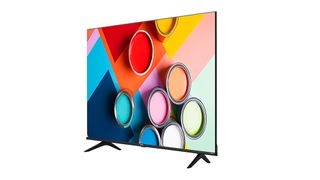
Screen sizes (in): 43, 50, 55, 65, 75
Tuner: DVB-T, T2-HD
4K: Yes
HDR: HLG, HDR10, HDR10+, Dolby Vision
Panel technology: LED
Smart TV: VIDAA
Dimensions (h x w x d, mm): 711 x 1232 x 74
Weight (kg): 11.3
Inputs: HDMI x 2, USB x 2, Ethernet, CI slot, RF and satellite aerial, wi-fi, Bluetooth
It’s unusual to find any departure from the accepted idea of ‘design’ where televisions are concerned, and that goes double when the TV in question is priced as aggressively as the Hisense A6G. So it follows that this TV looks reassuringly like a TV, with no gratuitous design flourishes to be seen.
The direct backlight arrangement (which Hisense refers to as ‘DLED’) dictates a chassis depth that’s on the bulky side - at 74mm the 55A6G doesn’t make all that compelling a case for wall-hanging. But it’s neat and tidy enough if you decide to stand it on its simple ‘boomerang’ feet, just as long as your shelf, table-top or what-have-you is wide enough - those feet are fairly far apart.
Build quality is perfectly acceptable, and while there’s nothing luxurious about the feel of the plastics from which the Hisense is mostly made, there are no creaks or groans from the frame either. Keep the price uppermost in your mind and there’s little to be disappointed about here.
As far as specification goes, it’s a similar story: not much about the way the Hisense A6G is equipped would tip you off to the fact it’s been built to compete right at the entry level of the market. It’s compatible with HLG, HDR10+ and Dolby Vision HDR standards - which is not something most far pricier 55in TVs can boast - and it has plenty of connectivity. Three HDMI sockets, all of which can deal with the ALLM and VRR aspects of HDMI 2.1 specification and one which is eARC-enabled, are joined by a pair of USB inputs (one 3.0, one 2.0), a CI card slot, Ethernet socket, RF aerial for the digital and analogue tuners, and a composite video input for your properly vintage equipment. Wi-Fi takes care of wireless functionality, and there are digital optical and analogue 3.5mm outputs.
Overall performance is handled by a quad-core processor, about which Hisense is far from forthcoming. It’s fast enough to get input lag down below 20ms when in ‘game’ mode, and it copes with a pretty comprehensive smart TV offering, though, so it would seem to be potent enough in operational terms at least.
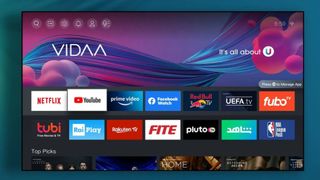
Smart TV (VIDAA or Android TV)
- VIDAA U5 smart TV in the UK
- Android TV in the US
- Alexa voice control
- Big, comprehensive remote control
Hisense is quite promiscuous where operating systems are concerned - with the A6G it’s gone with it’s in-house VIDAA system. And as far as these things go when they’re not Samsung’s Tizen or LG’s webOS, VIDAA U5 is pretty decent. It can be customized, which is always nice, and app support is pretty good (inasmuch as the likes of Netflix and Amazon Prime Video are available, while Apple TV and Disney+ are not).
In the US, however, you'll find the A6G comes equipped with Android TV. Android TV, especially on entry-level TVs like this can be a bit slower than some of their high-end counterparts but at least Android TV is well-stocked with apps. You'll find all the basics here, and the smart platform will do its best to recommend shows and movies you might like based on your previous viewing history.
Amazon Alexa voice control is built in (it’s accessible via the Remote NOW app), or there’s the remote control handset. It’s big and comprehensive, with something approaching a plethora of direct access buttons - so if you simply cannot wait another second for access to Netflix, Amazon Prime Video, YouTube, Freeview Play or, um, Rakuten TV, you’re covered.
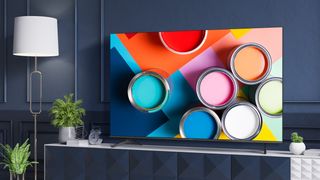
Picture quality
- Detailed 4K images
- Strong motion handling
- Poor upscaling and contrast
Between the HDMI inputs and the smart TV interface, it’s the work of a moment to get some native 4K content on board. And thanks to set-up menus that are either mercifully brief or frustratingly restricted (depending on your point of view), it won’t be long before you’ve achieved the most pleasing picture balance available.
With a Netflix-derived 4K Dolby Vision stream of Enola Holmes up and running, there are obvious and numerous positives to the way the Hisense goes about its work. Detail levels, for example, are respectably high - and that’s true of even the finest details of texture or skin-tone. There’s very agreeable insight into darker tones, without the rather artificial cast some screens can succumb to when trying to eke out the minutiae from dimly lit scenes.
Motion-handling, too, is more than acceptable. The most complex on-screen movement can momentarily betray the amount of work the A6G is getting through, but for the vast majority of the time it simply takes a firm grip of motion and describes it faithfully. The stability and authority the Hisense demonstrates puts it well ahead of any number of ‘entry-level’ alternatives from any number of rival manufacturers.
It’s similarly accomplished where colour fidelity is concerned, even if it’s not capable of delivering the tiniest variations in tone and shade that some much more expensive televisions can manage. The balance here between ‘natural’ and ‘vivid’ is nicely struck, and even with content that relies on an overdriven colour palette (anything at all from the ‘Marvel’ franchise, for instance) colours stay the right side of ‘searing’.
There’s a definite flatness to the images the Hisense serves up, though, an overt two-dimensionality where plenty of modestly priced alternatives can generate half-decent depth of field. And while we’re being mildly picky, it’s safe to say the 55A6G isn’t capable of delivering actual black - instead the best it can muster is a variety of extremely deep grey. Combined with the screen’s lack of outright brightness, it means contrasts are understated and there’s a definite lack of ‘pop’ when white tones dominate the screen.
As an upscaler, the Hisense is reasonably adept with 1080p content and all at sea with anything less information-rich. Taking a Full HD image and making it fit the screen doesn’t impact too badly on detail levels or colour fidelity, and motion remains admirably smooth and stable too. But edges can get a bit restless, and the depth of field that is at such a premium with 4K stuff disappears altogether. But taking some DVD-borne information, say, or (worst-case scenario) some daytime TV broadcasts gives the A6G what used to be called ‘the vapours’. Detail levels fall off a cliff, to be replaced by ambiguity and noisiness. Few are the televisions capable of making pictures look simultaneously soft and edgy, but the Hisense 55A6G is one of them.
Audio performance
- 16 watts of stereo power
- Apathetic sound
- Demands a soundbar
There are many TVs, at all sorts of prices, which make us suggest you buy a soundbar. The Hisense A6G is a TV that makes us shout ‘BUY A SOUNDBAR’ at the tops of our voices. It’s fitted with an audio system of two full-range drivers powered by a total of 16 watts - and while Hisense may have been shooting for ‘smooth and inoffensive’ it’s actually ended up with ‘bland and uninvolving’.
Dialogue is distinct, to be fair, and the top of the frequency range isn’t as zizzy as it might have been. But low frequencies are basically absent, and at anything other than very modest volume levels the Hisense sounds asthmatic. You don’t have to spend very much money at all on a soundbar that will wipe the floor with the audio system fitted to the A6G.
Should you buy the Hisense A6G 4K HDR TV?
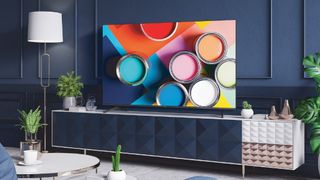
Buy it if...
You’re operating on a budget
Hisense is a past master at delivering big, well-spec’d TVs at low prices - and here’s another example of that.
You don’t want to hang your TV on the wall
At 74mm deep the A6G is a bit of a throw-back to the early days of 'flatscreen' TVs.
You already own a soundbar
Otherwise you’re looking at further (and essential) outlay.
Don't buy it if...
You enjoy getting involved in set-up
There are very limited opportunities to influence picture performance here.
You want a fully stocked smart TV interface
VIDAA U5 is a good portal as far as it goes - it just doesn’t go all that far. Android TV is better, but not quite top-tier either.
You expect to get away without spending money on a soundbar
You won’t. Trust us.
- Looking for something smaller? Check out our guide to the best 40-inch TVs
- See discounts on older models with our best TV deals roundup
You might also want to check out our review for the Hisense H55U7B TV.
Simon Lucas is a senior editorial professional with deep experience of print/digital publishing and the consumer electronics landscape. Based in Brighton, Simon worked at TechRadar's sister site What HiFi? for a number of years, as both a features editor and a digital editor, before embarking on a career in freelance consultancy, content creation, and journalism for some of the biggest brands and publications in the world.
With enormous expertise in all things home entertainment, Simon reviews everything from turntables to soundbars for TechRadar, and also likes to dip his toes into longform features and buying guides. His bylines include GQ, The Guardian, Hi-Fi+, Metro, The Observer, Pocket Lint, Shortlist, Stuff T3, Tom's Guide, Trusted Reviews, and more.
